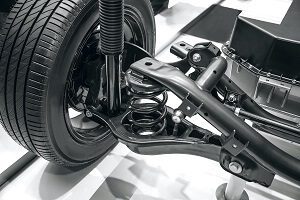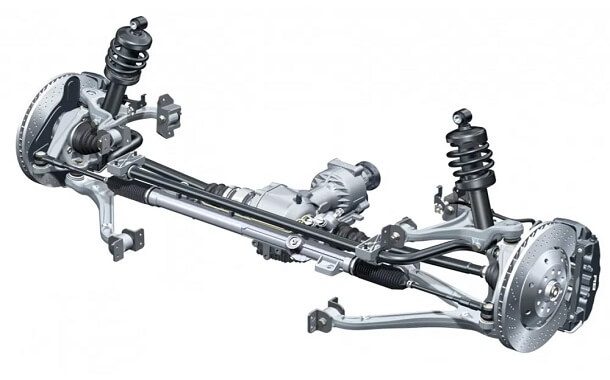Suspension System Repair Cost
Last Updated on September 14, 2023
Written by CPA Alec Pow | Content Reviewed by ![]() CFA Alexander Popinker
CFA Alexander Popinker
The suspension system has been designed to provide stability and dampen the car’s sudden movements on uneven roads, ensuring passenger comfort and safety. If one of the car parts or components of the suspension system fails in a turn, the car becomes uncontrollable. This is why you must immediately repair your vehicle.
How much does the suspension system repair cost?
You should expect to pay around $3,200 on average for a suspension system repair, including the cost of bearings, springs, and shocks. Depending on the make and model of your car, the typical price range for a full-scale suspension system repair would be anywhere between $1,100 and $5,200.
In the table below you will find the average costs of suspension system repair for some of the most popular car models.
| Make and Model | Price |
| Toyota Corolla | $2,200 |
| Toyota Camry | $2,100 |
| Honda CRV | $2,800 |
| Honda Civic | $2,000 |
| Ford F-150 | $4,200 |
| Chevy Silverado | $5,300 |
| Audi A4 | $4,200 |
| BMW 3 Series | $5,300 |
| Nissan Altima | $3,000 |
A suspension system is made of many components, but the most important parts are the springs, struts/shocks, and ball joints.
The majority of the damages to the suspension system may appear in one of these parts. You may need to repair the whole suspension system if it is thoroughly broken. However, the repair costs can be considerably reduced if you need to replace only a few certain parts.
You might also like our articles on the cost of shocks and struts, ball joints, or tire pressure sensors.
Springs Cost
One of the most important components which absorbs the shocks from the road is the suspension springs. These may lose their elasticity and become deformed over time. Expect to pay almost $420 for a coil spring replacement.
Though, for some car models, the cost of spring replacement is under $300, while for others you will have to pay anywhere between $610 and $820.
In the table below you will find the average costs of suspension spring replacement for some of the most popular models of cars.
| Make and Model | Cost |
| Audi A4 | $600 |
| BMW 3 Series | $500 |
| Nissan Altima | $360 |
| Ford F-150 | $360 |
| Chevy Silverado | $370 |
| Honda CRV | $300 |
| Honda Civic | $210 |
| Toyota Corolla | $250 |
| Toyota Camry | $270 |
The majority of modern vehicles have a minimum of four coil springs and you should replace all of them at once so they have the same rigidity and structure. For example, you will have to pay around $1,100 to replace all four springs for a Toyota Camry.
Struts/Shocks Cost
A spring is good at compressing and absorbing energy, but not so good at releasing it when it tends to return uncontrollably. In a car, that uncontrolled action would spoil its path and maneuverability. Here is where the shock absorber or struts come into play. Depending on the type of suspension, it is either close to the coil spring or just inside it.
In general, struts/shocks are one of the most expensive components of a suspension system to replace. The average cost is almost $820. In the table below you will find the average costs for shock replacement for different car models.
| Make and Model | Price |
| Audi A4 | $1,700 |
| BMW 3 Series | $2,000 |
| Nissan Altima | $850 |
| Ford F-150 | $650 |
| Chevy Silverado | $1,400 |
| Honda Civic | $830 |
| Toyota Corolla | $650 |
| Toyota Camry | $700 |
Ball Joints Cost
The ball joints transmit the traction force between the vehicle and the road and maintain the correct orientation of the wheels according to the body.
It would be really hard to control your vehicle if the ball joints will break. Compared to other parts of the suspension system, the cost of the ball joints is lower. Plan on spending around $170 in order to replace a ball joint.
Most of the vehicles have a minimum of two ball joints, so you will have to pay around $340 to replace front ball joints. In the table below you will find the average cost of ball joint replacement for different models of cars.
| Make and Model | Price |
| Audi A4 | $310 |
| BMW 3 Series | $290 |
| Nissan Altima | $150 |
| Ford Fusion | $180 |
| Ford F-150 | $290 |
| Chevy Silverado | $360 |
| Honda CRV | $180 |
| Honda Civic | $200 |
| Toyota Corolla | $260 |
| Toyota Camry | $180 |
Factors that affect the cost
The number of components
The repair costs of a suspension system are greatly influenced by the number of components a vehicle has. For instance, the majority of the trucks have at least four ball joints, while the majority of the front-wheel-drive Sedans have only two ball joints.
Make and model of your car
The costs will be influenced by the make and model of your car as the luxury and high-performance models may have technology and special parts which are more expensive. For example, you will have to spend more in order to repair the suspension system of a BMW 328i compared to a Honda CRV.
Nature of damage
As the suspension system is made of several parts that have different costs, some repairs are cheaper than others. For instance, it will be more expensive to repair a suspension frame or a broken shock absorber than to replace a broken spring.
Age of your vehicle
It would be more cost-effective to replace the whole suspension system rather than only the parts if your vehicle is over ten years old. A brand-new suspension system will be more resistant and durable than an old system with some new components.
Suspension System Overview
 It is quite easy to understand what the suspension system does. From its very name we can understand that, for the most part, the suspension has the role of lifting something from the ground and maintaining it in this state, in an effort to minimize the impact of the forces with which it comes into contact. Therefore, the key roles of a suspension system include:
It is quite easy to understand what the suspension system does. From its very name we can understand that, for the most part, the suspension has the role of lifting something from the ground and maintaining it in this state, in an effort to minimize the impact of the forces with which it comes into contact. Therefore, the key roles of a suspension system include:
- absorption of vibrations and impact forces with the road;
- maintaining contact between the wheels of the car and the driving surface.
There are several types of car suspension systems.
- Mechanical suspension
- Hydraulic suspension
- Hydro-pneumatic suspension
- Pneumatic suspension
- Magnetic suspension
The mechanical suspension works on the basis of spring, shock absorbers, and ball joints.
Signs of a bad suspension system
If driving is no longer comfortable, you hear noises, you feel shocks, every bump in the road, your body shakes, so you have a difficult ride, it is a sign that you have to deal with a damaged suspension system.
Difficult braking
If you feel the car swinging up and down when you brake, it is a sign that the shock absorbers are not working properly. Such a behavior of the vehicle affects your ability to stop it quickly. So, a faulty suspension system increases the braking time by up to 20%.
Balance test
If you suspect that the suspension is not working properly, try a simple test. Get out of the car, head for the hood and lean on it, jump a few times, then get up. Repeat this on the rear hood. If the car continues to swing more than 2-3 times after you get up, it turns out that the suspension is worn.
Loss of control in curves
With a faulty suspension system, you will often feel the need to pull hard on the steering wheel when cornering. It indicates that the vehicle no longer remains stable to the centrifugal force of a turn, thus increasing the risk of a rollover. If you feel this way, it’s time to go to a car service.
Fluid loss
Look under the vehicle at the shock absorbers. If there are stains, there is a chance that liquid will leak from the shock absorbers, so it does not work properly. It’s time to replace them.
Tire wear
Carefully analyze the tires; if you notice uneven pressure, it turns out that the suspension system does not keep the vehicle evenly, therefore putting more pressure on some wheels.
FAQs
How much does it cost to repair the suspension system?
If the entire suspension system needs to be replaced, then the costs of such an operation are quite high. If only a shock absorber or spring needs to be replaced, the process is easy and the parts are not very expensive. It all depends on the type of suspension system that the car has and the knowledge in this field.
Due to the evolution of technology and equipment used in this field, there are systems that can only be repaired by authorized personnel, their costs being quite high but the comfort offered is far superior to traditional suspensions.
How does a car’s suspension system work?
If the roads were perfectly straight, with no imperfections, a suspension system would not be necessary. But the roads are far from smooth. Even newly poured asphalt has small imperfections that can interact with the car. According to Newton’s Laws of Motion, all forces have magnitude and direction. An uneven asphalt results in the up and down movement of the wheels.
The magnitude depends on the size of the imperfections encountered. Whatever the size of these obstacles, the wheels of the car will suffer a vertical acceleration when passing over them. Without an intervening system, all this vertical energy is transferred to the frame that will move in the same direction, resulting in loss of traction/contact. Thus, the suspension system works like a sponge that absorbs this vertical energy and allows the wheels to get over bumps easily while maintaining the comfort of travel.
How should the car suspension system be maintained?
Maintaining the integrity of the car and, implicitly, of the suspension system, is absolutely necessary to ensure a safe journey every time the car will be driven. Here are some things to keep in mind:
- At each oil change, check each component of the suspension system;
- Check each rubber element of the system;
- Check for cracks, bumps, or other unwanted elements on the parts of the system;
- Inspect oil leaks for shock absorbers. If they appear damp, it is a clear sign that parts need to be replaced.


Leave a Reply
Want to join the discussion?Feel free to contribute!